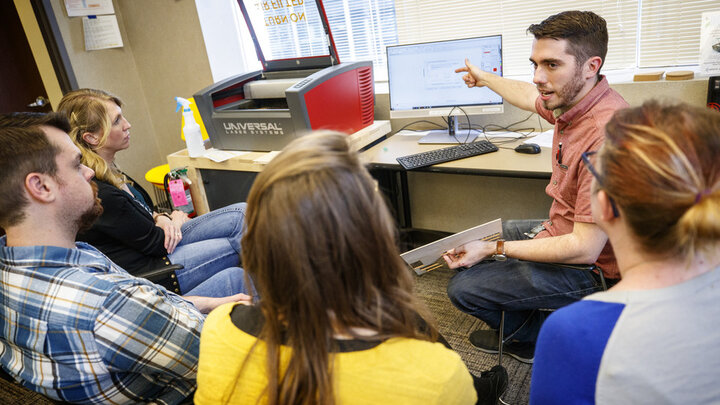Nebraska Innovation Studio, extension helping communities transform libraries

Back in 2012, Beatrice Public Library leaders and stakeholders had an eye toward the future as they drew up plans for a building renovation. Among the ideas was an area to house a makerspace.
“Some in the public hadn’t heard of this concept, so we ended up not having the full space,” library director Laureen Riedesel said. “We do have a 3-D printer and computers set up there, and our idea is to let it evolve and as people become aware of what we have, they’d ask for machines that we could add.”
Now, the Beatrice community will be exposed to an entire makerspace suite for the next five months, thanks to the Library Innovation Studios project. Library Innovation Studios launched in 2017 and has impacted 17 Nebraska communities, with plans for 13 more communities to receive makerspace equipment through the program, including libraries in Hastings, Laurel, Plainview, Verdigre and Chadron this summer. Each community gets to house the makerspace suite for 20 weeks.
“Obviously, this is just a huge leg up in terms of allowing the community to see all of the possibilities,” Riedesel said.
The program is run by a consortium comprised of the Nebraska Library Commission, University of Nebraska-Lincoln, Nebraska Extension, Nebraska Innovation Studio and Regional Library Systems. The grant funding was given by the Institute of Museum and Library Services, with each member of the consortium matching a portion through monetary donations and in-kind services.
With the grant, four sets of makerspace equipment were purchased, and the sets have rotated through Nebraska since November 2017. Max Wheeler, instructional designer with NIS, has been overseeing the installations of the makerspaces, along with writing operating procedures for the equipment. He and Nebraska Library Commission staff spend two to five days in each community training library personnel and community volunteers on how to use the machines and computer programs. After the installations, he continues training and troubleshooting any issues throughout the 20-week period of each makerspace.
On the ground in the communities are Nebraska Extension educators who also help train and develop programming for community learning.
Joanne Neeman, youth services librarian in Beatrice, said she has been working with extension educator Jacie Milins to come up with curriculum for summer maker camps, storytime programming and community activities.
Since the Beatrice Public Library was selected for the program, public interest in the makerspace has soared, and Riedesel is taking requests for future library purchases after the 20-week period is up. She hopes a library makerspace will benefit Beatrice’s economy, as was suggested by an economic development report commissioned by the Beatrice City Council in 2018.
“That report highlighted that what is unique about Beatrice is that this is a manufacturing community going back to the 1870s, so we’ve had people making things for nearly as long as the town has been here,” she said. “Some of our factories have closed, but we still have all kinds of makers here. We have the mindset here for a maker economy.”
Wheeler said as libraries rotate out of the program, many are purchasing equipment to keep the makerspaces going, and NIS continues to partner with the libraries in those endeavors.
“It’s an economic development tool, but it also enhances the quality of life in these communities,” Wheeler said.
